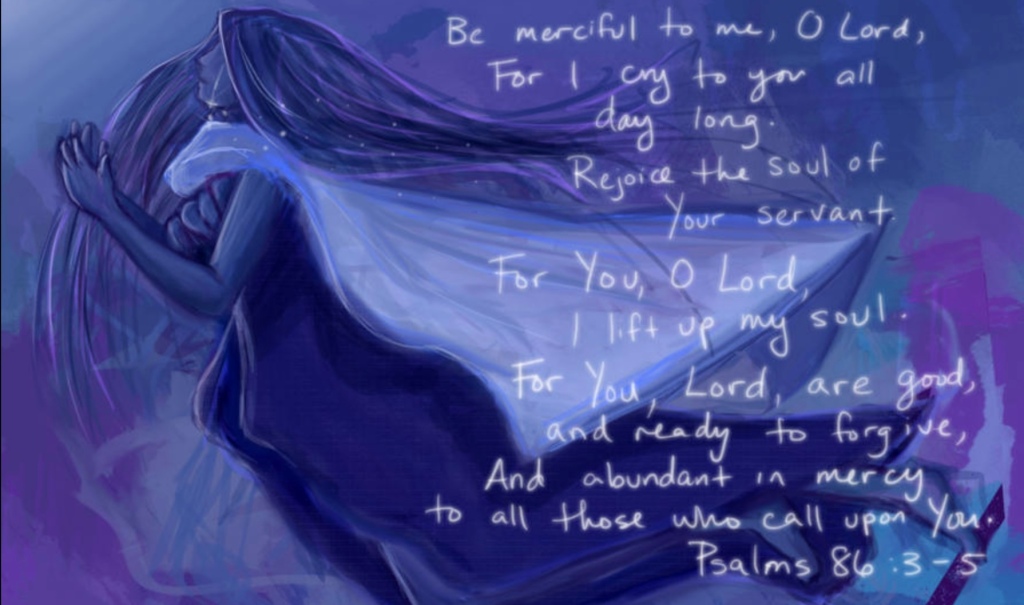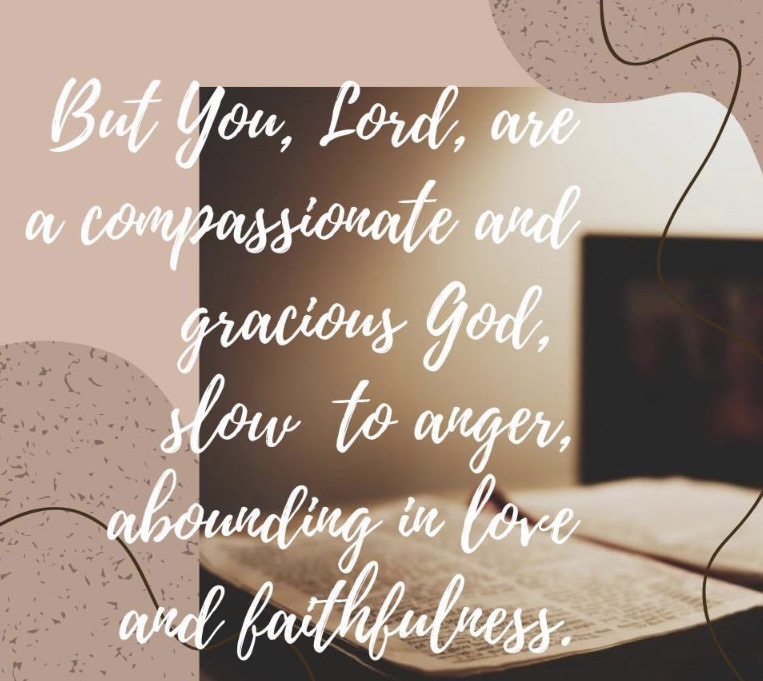Psalm 86 is offered by the lectionary for this coming Sunday, the Fourth Sunday after Pentecost. This psalm comprises a string of prayers, offering petition, thanksgiving, adoration, and intercession, filled with phrases that occur in other psalms and prayers in Hebrew Scripture. Although some commentators have criticised it for being unoriginal, it serves an important purpose, collating many phrases that can serve well those who pray.
In an earlier blog, I considered the structure of this psalm, and explored three types of prayers that are to be found in it: thanksgiving, adoration, and intercession. See
In this blog, I turn my attention to the petitions that are included in this psalm. The opening section (verses 1–7) includes a substantial collection of petitions to be prayed in times of trouble. Along with the further petitions in verse 11 and verses 16–17, there are a total of eleven petitions to God in this psalm. Let’s consider each of them in turn.

“Incline your ear, O Lord” (v.1) is a request made in other psalms (Ps 17:6; 31:2; 71:2; 88:2; 102:2); in one psalm, there is a confidence that God “will hear the desire of the meek … will strengthen their heart … will incline your ear to do justice” (10:17–18). Likewise, a number of psalms include the request for God to “answer me” (v.1; see Ps 4:1; 13:3; 27:7; 55:2; 69:13, 16, 17; 102:2; 108:6; 119:145; 143:1, 7). In one psalm the author affirms that “I call upon you, for you will answer me, O God” (Ps 17:6); likewise, in Ps 86, the psalmist affirms with confidence that “in the day of my trouble I call on you, for you will answer me” (v.7).
In the same verse, the psalmist describes themselves: “I am poor and needy” (v.1)—a self-description also offered at Ps 40:17; 70:5; and 109:22. The phrase is placed in parallel with “the downtrodden” at Ps 74:21. That God stands with the poor and needy is asserted regularly in the psalms; “because the poor are despoiled, because the needy groan, I will now rise up, says the Lord; I will place them in the safety for which they long” (Ps 12:5).
So God “raises the poor from the dust and lifts the needy from the ash heap” (Ps 113:7); God “maintains the cause of the needy and executes justice for the poor” (Ps 140:12). “As for me, I am poor and needy, but the Lord takes thought for me; you are my help and my deliverer, O God” (Ps 40:17; also 70:5). And the psalmist pleads that the king will “judge your people with righteousness and your poor with justice … defend the cause of the poor of the people, give deliverance to the needy” (Ps 72:2, 4)
“Preserve my life” is the next petition (v.2), echoing the same prayer found at Ps 64:1; 79:11; 119:49, 159; 143:11; a prayer made on the basis that God is “a hiding place for me [for] you preserve me from trouble” (Ps 32:7), for “though I walk in the midst of trouble, you preserve me against the wrath of my enemies” (Ps 138:7).
The psalmist undergirds this request to God with the declaration, “I am devoted to you” (v.2), a phrase that might also be translated as “I am a godly person” or “I am a faithful person”. The Hebrew word used here, hasid, is the basis for the contemporary group of ultra-conservative Orthodox Jews known as Hasidic Jews. Many psalms uses this word as a description for those in Israel who were godly people (Ps 12:1; 52:1) or faithful people (Ps 4:3; 16:10; 30:4; 32:6; 37:28; 50:5; 52:9; 79:2; 85:8; 89:19; 97:10; 116:15; 132:9, 16; 145:10). The NRSV also translates this word as blameless (Ps 18:25) and as saints (Ps 31:23).
*****
The plea of the psalmist for God to “save” them (v.2) is another persistent refrain throughout the psalms—both “save me” (Ps 6:4; 7:1; 22:21; 31:2, 16; 44:6; 54:1; 57:3; 59:2; 69:1; 71:2, 3; 109:26, 116:4; 119:94, 146; 142:6; 143:9) and “save us” (Ps 28:9; 31:2; 80:2; 106:47; 118:25). This is a request grounded in the assurance that “God is my shield, who saves the upright in heart” (Ps 7:10); “the Lord is near to the brokenhearted, and saves the crushed in spirit” (Ps 34:18); God “fulfils the desire of all who fear him; he also hears their cry, and saves them” (Ps 145:19). Of course , God as Saviour is an important Hebraic way of understanding the divine, that then has implications and influence as the New Testament documents are written, centuries later.
The self-description of the psalmist in this verse, as “your servant who trusts in you” (v.2), is a description found also in verses 4 and 16. The writer presents themselves as God’s servant in a number of other psalms (Ps 19:11, 13; 27:9; 31:16; 35:27; 69:17; 109:28; 116:16; 143:2, 12) as well as twelve times in Psalm 119 (vv.17, 23, 38, 49, 65, 76, 84, 124, 125, 135, 140, 176).
The attitude of trust in God (v.2) is a stance which is shared with other psalms. “Those who know your name put their trust in you, for you, O Lord, have not forsaken those who seek you”, the psalmist sings (Ps 9:10). “O my God, in you I trust; do not let me be put to shame; do not let my enemies exult over me” (Ps 25:2), they sing, affirming that “steadfast love surrounds those who trust in the Lord” (Ps 32:10), “happy are those who make the Lord their trust” (Ps 40:4), and “in God I trust; I am not afraid” (Ps 56:4; and similar, 55:23).

“Be gracious to me, O Lord” (v.3) is yet another petition that is typical of the psalms. The psalmist regularly implores God, “be gracious to me, for I am in distress” (Ps 31:9; similarly, 6:2; 9:13; 56:1), or “be gracious to me, and hear my prayer” (Ps 4:1), or “be gracious to me and answer me” (Ps 27:7), or simply, “be gracious to me” (Ps 25:16; 26:11; 30:10; 41:4).
In one song, the psalmist muses, “has God forgotten to be gracious?” (Ps 77:9), but in typical style, this cry of lament transforms into words of praise, for “you are the God who works wonders … with your strong arm you redeemed your people” (Ps 77:11–20). God showing grace towards God’s faithful people is indeed “your custom toward those who love your name” (Ps 119:132).
The cry for God to be gracious is a constant and insistent plea, “for to you do I cry all day long” (v.3). The cry of the psalmist is expressed often (Ps 3:4; 5:2; 17:1; 18:6; 27:7; 28:2; 39:12; 57:2; 61:1; 77:1; 88:1–2; 102:1; 119:146–147, 169; 120:1; 142:1, 5–6). Even though the psalmist cries to God “with my whole heart” (Ps 119:145), there are times when this cry feels futile; “I cry by day, but you do not answer me, and by night, but find no rest” (Ps 22:2), and “O Lord, I cry out to you; in the morning my prayer comes to you; why do you cast me off? why do you hide your face from me?” (Ps 88:13–14).
Yet the psalmist is persistent, crying “all day long” (v.3); this mirrors the oppression and distress experienced by the psalmists “all day long”. Various psalms reflect “sorrow in my heart all day long” (Ps 13:2), “groaning all day long” (Ps 32:3), “all day long I go around mourning” (Ps 38:6), “all day long I have been plagued” (Ps 73:14). “All day long my foes oppress me” (Ps 56:1), laments the psalmist, “all day long my enemies taunt me” (Ps 102:8), even bemoaning that “we are being killed all day long” (Ps 44:22). Extended personal distress seems to mark a number of psalms.
However, in other psalms, we have affirmations that “the eyes of the Lord are on the righteous and his ears are open to their cry” (Ps 34:15); “when the righteous cry for help, the Lord hears” (Ps 34:17); “I waited patiently for the Lord; he inclined to me and heard my cry” (Ps 40:1); “he regarded their distress when he heard their cry” (Ps 106:44). As the psalmist cries “out of the depths”, so they are assured that “with the Lord there is steadfast love, and with him there is great power to redeem” (Ps 130:1–8).
The same dynamic, of calling out to God and anticipating an answer, is sung in the petition in v.6, “give ear, O Lord, to my prayer”. This is found in ten other psalms (Ps 5:1; 17:1; 39:12; 54:2; 55:1; 80:1; 84:8; 140:6; 141:1; 143:1), and the parallel request, “listen to my cry of supplication” (v.6) is also offered in two other psalms (Ps 5:2; 61:1).
The psalmist’s confidence that, “on the day of my trouble I call on you, for you will answer me” (v.7), is also reflected at Ps 17:6. This confidence is undergirded by the words spoken by God to those who trust in God: “those who love me, I will deliver; I will protect those who know my name; when they call to me, I will answer them” (Ps 91:14–15).

Verse 11 moves from the offering of prayers and anticipation of receiving answers, to the request to “teach me your way, O Lord, that I may walk in your truth”. The language here reflects another common element in the relationship between the psalmist and the divine, as a student learning from a teacher.
“Teach me” (v.11) is what the psalmist asks for, seeking to be taught “your ways … your paths … your truth” (Ps 25:4–5), “your way” (27:11; 143:8), “your will” (Ps 143:10), “the fear of the Lord” (Ps 34:11), and “wisdom in my secret heart” (Ps 51:6). Throughout the longest psalm of all, there are regular petitions for the Lord to teach “your statutes” (Ps 119:12, 26, 33, 64, 68, 124, 171) as well as “good judgement and knowledge” (Ps 119:66). The psalmists appear to be keen students, thirsting for knowledge.
The next request is for God to “give me an undivided heart” (v.11)—an unusual request, not found in any other psalm, and using a Hebrew word that appears in only two other places in Hebrew Scripture (Gen 49:6; Isa 14:20). The purpose of this request, “to revere your name” (v.11), draws on a very common Hebrew word, found often in the formulaic “do not be afraid” (Gen 15:1;21:17;26:24; 35:17;46:3; Exod 14:13; 20:20; etc.; and on into New Testament texts). This is no fear in the sense of negative terror, for the psalmist clearly draws on the positive sense of the verb, yare’, to indicate a reverence towards God.
*****
In the final set of verses, there are three further petitions worthy of note. “Turn to me and be gracious to me” (v.16) is a petition repeated exactly (Ps 25:16; 119:132) and in shortened form, “turn to me” (Ps 69:16; 119:79). “Give your strength to your servant” (v.16) recalls the closing verse of a powerful nature psalm, “may the Lord give strength to his people! may the Lord bless his people with peace!” (Ps 29:11). The latter part of verse 16, “save the child of your serving girl”, echoes the petition of verse 2, “save your servant who trusts in you”, which we have dealt with above.
Finally, “show me a sign of your favour” (v.17) does not reflect any other psalm, but does evoke the petition of Gideon to the Lord, “now I have found favour with you, then show me a sign that it is you who speak with me” (Judg 6:17).
The purpose of this sign which is sought by the psalmist, “so that those who hate me may see it and be put to shame” (v.17), does however reflect a common request across a number of psalms, pleading for enemies to be “put to shame” (Ps 6:10; 31:17; 35:4, 26; 40:14; 50:5: 57:3; 70:2; 71:13, 24; 83:17; 97:7;109:28; 119:78; 129:5). The other side of this petition is the request, “do not let me be put to shame” (Ps 25:2, 20; 31:1, 17; 71:1; 119:31, 116).
*****
And so we can see that throughout this psalm, in offering petition, thanksgiving, adoration, and intercession, the psalmist has made use of many phrases that occur in other psalms and prayers in Hebrew Scripture. This psalm, a primer for prayer, serves an important purpose, as it draws together many phrases that can serve well those who pray.





